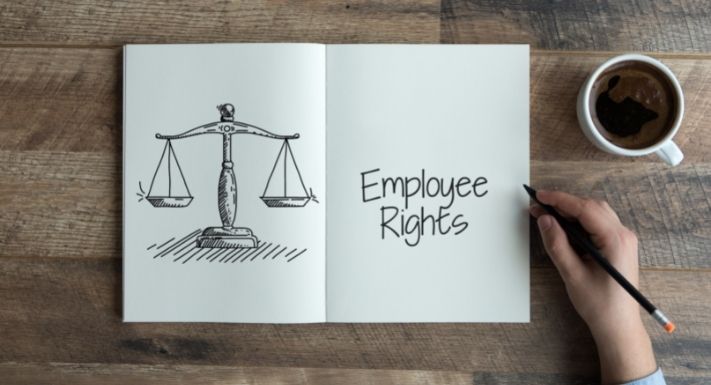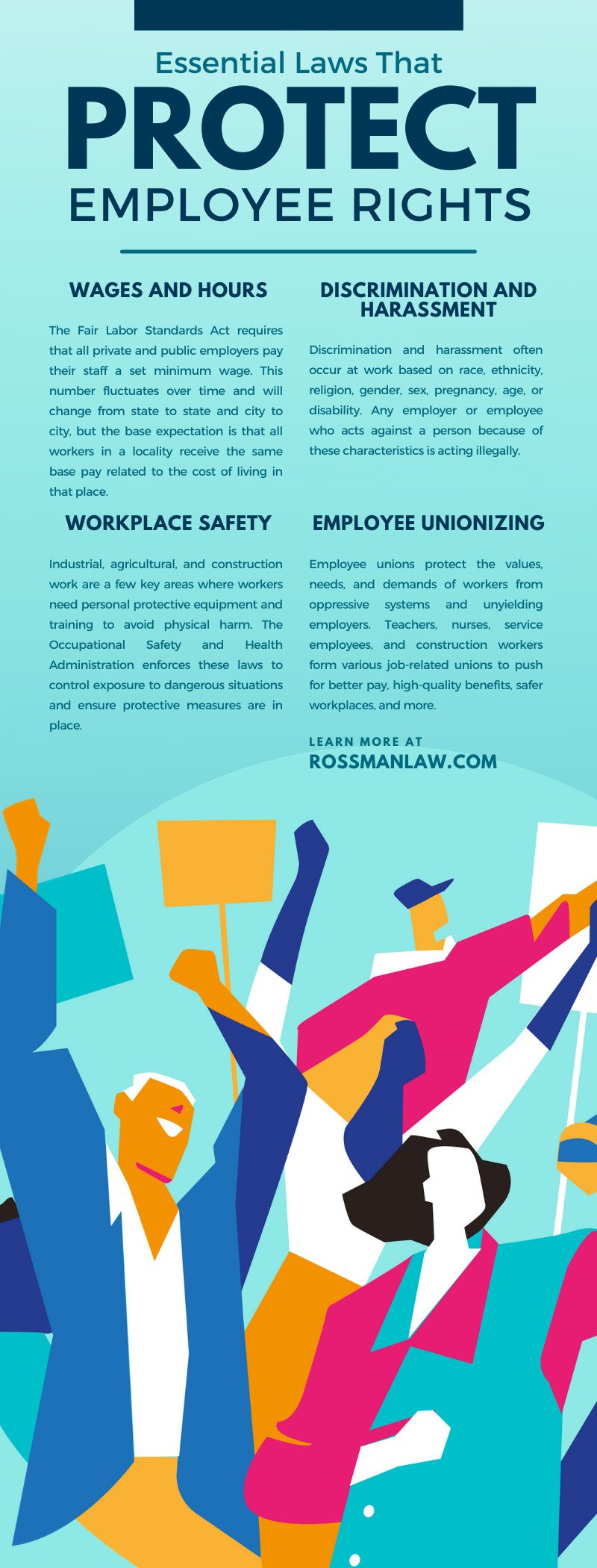
Questions To Ask Your New Doctor
June 11, 2021
Why You Might Need a Lawyer This Summer
July 6, 2021Labor laws undergird workplace dynamics and set the scene for the relationships between employers and employees. The workplace should be a place of safety both physically and emotionally, but sadly this is not always the case. When you have problems at work, illegal activity is sometimes the root of the problem. Here are the essential laws that protect employee rights.
Labor Law Basics
Labor laws exist to protect every working person in the United States. While each office is different, there are universal expectations for workplace dynamics. These are the basics of labor laws and how they affect laborers.
What Are Labor Laws?
Labor laws, as the name implies, are all about the rules and regulations at the workplace. The federal, state, and local governments establish acceptable boundaries for employers and employees, regardless of where they work. This legislation establishes the legalities surrounding discrimination, unionizing, compensation, safety, and more. Toxic work environments are often the result of unchecked practices that are technically illegal. You may see or experience something that feels wrong or hurtful while at work. Do not discount these experiences and roll with the punches; labor laws solely exist to protect you.
Who Keeps Track of These Laws?
Every human resources department is responsible for keeping up to date on employment law and enforcing the rules in all company activities. If a small business lacks a formal HR department or even an outsourced HR system, the manager or owner in charge must handle these standards. No matter the company’s size, there is no excuse for harassment, discrimination, unpaid wages, or hazardous working conditions. Labor laws tell employers how to run their business while also showing employees what to expect. If there are any discrepancies between the legal standards and your workplace experiences, you may have grounds for a lawsuit.
Why Do We Need Labor Laws?
Imagine a world where your boss can do anything to you without repercussion. They force you to work longer hours without overtime pay, expose you to dangerous conditions without training or protection, and harass you based on your race, ethnicity, gender, or disability. For many people, this is their daily experience, and it should not be this way. Labor laws serve working people and protect them from workplace abuses. While the employer-employee dynamic involves a high-stakes authority imbalance, this power differential does not justify illegal behavior. We all need labor laws because employers and employees alike will act inappropriately, and these instances are unacceptable.
Important Labor Laws To Know
Labor laws cover all facets of the working experience from interpersonal relationships, workplace expectations, work-life balance, and more. These are the critical labor laws that dictate acceptable and unacceptable conditions.
Wages and Hours
We all work to live—living requires money, and money comes from work. People work hard for their paychecks, and they should receive just compensation for their hours. While there are subtleties in workplace expectations based on full- and half-time and exempt and non-exempt staff, the overall expectation is that people receive fair pay for the set amount of work.
The Fair Labor Standards Act requires that all private and public employers pay their staff a set minimum wage. This number fluctuates over time and will change from state to state and city to city, but the base expectation is that all workers in a locality receive the same base pay related to the cost of living in that place. So, for example, people in rural Georgia will have a much lower minimum wage than people in New York City.
Wages also relate to your worked hours as an employee. The typical nine-to-five job accrues about forty hours in a five-day workweek. Times, totals, and workdays will change based on the job description, but the expectation is that you receive money for every hour worked, including overtime pay. Overtime is any hour worked above the role expectation, and companies must pay employees the equivalent to a time-and-a-half for those hours. The only caveat to overtime pay is that not every position can claim it. When you sign an employment contract, you likely acknowledged whether your role is exempt or non-exempt. Exempt employees have no entitlement to overtime pay, while non-exempt employees do.
Discrimination and Harassment
Over the years, the legal system acknowledges more and more groups that should have protections against discrimination. Employers should respect a person’s intersectionality, not discriminate against them for it. Discrimination and harassment often occur at work based on race, ethnicity, religion, gender, sex, pregnancy, age, or disability. Any employer or employee who acts against a person because of these characteristics is acting illegally. From hiring to firing, labor laws hold companies to a high standard where equal employment and nondiscriminatory practices reign supreme.
Workplace Safety
Workplace safety is of utmost importance to dozens of industries where people work with heavy machinery, dangerous tools, and hazardous substances. Industrial, agricultural, and construction work are a few key areas where workers need personal protective equipment and training to avoid physical harm. The Occupational Safety and Health Administration enforces these laws to control exposure to dangerous situations and ensure protective measures are in place.
Employee Unionizing
Companies need their employees to complete any work, and staff often use this to their advantage. Employee unions protect the values, needs, and demands of workers from oppressive systems and unyielding employers. Teachers, nurses, service employees, and construction workers form various job-related unions to push for better pay, high-quality benefits, safer workplaces, and more. While there are rules and regulations for forming unions, an employer cannot stop you from doing so, just as they cannot hinder you from joining an already existing one in your industry.
Knowing the essential laws that protect employee rights gives you the tools to stand up for yourself in the workplace. Whether you work in an enormous corporate entity or a small local business, you have entitlements. Do not ignore any suspicious behavior against you or a colleague. If you need an employment attorney in Boise, Idaho, our team at Rossman Law Group will aggressively fight for the compensation you deserve. Contact us today and set up a consultation with our legal team.






